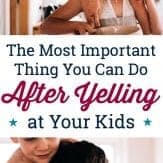Inside: Do you ever feel like you’re a parent who yells too much? Try this simple (but important) step after yelling at your kids to get the cooperation you truly want.
I opened the front door of the tiny 400 square foot cabin, where we are temporarily living, walked to the back, sat at the picnic table and pulled my knees to my chest. My head buried into my knees, and all I wanted in that moment was one thing.
To hide.
My kids ages two and four sat inside. My kids. My two sweet kiddos who were looking for guidance from me. And I was hiding from them.
My hands covered my head burying it deeper into my knees, and I imagined they were wondering what happened to their mom lately.

Before I could think any longer, I heard the gravel crunching nearby and picked up my head to see what was happening.
My son stood next to me, looked up and what he said next broke my heart. “Are you angry again momma?”
Here’s the truth.
I was angry. I checked myself to be sure. Yep, definitely angry. Frustrated too.
Parenting…it can feel a little chaotic and stressful. In fact, somedays it can feel like seeing a tornado smack dab in the middle of a trailer park. Stuff is flying everywhere, it’s loud, and more than anything, you’re just trying to survive.
But did you know that when you’re stressed, your brain goes into “flight or fight” mode?
This is the reason you hear about moms either yelling at their kids (“fight”) or running to hide in the bathroom with chocolate (“flight”).
Talk about a revelation.
Repeated activation of your brain’s “fight or flight” response, tells your brain that the environment is not safe.
This is where the vicious cycle of yelling can start to take over, your connection with your kids can slowly erode, and before you blink, each small thing can start to feel like you’re fighting for your life.
Your brain is tricked into thinking…if you just yell louder you’ll win the “fight.”
It affects your kids too.
When your stress level spikes into the red and you chronically yell, there is a reaction that follows for both you and your kids. Many times this reaction is everyone feeling like they need to constantly “fight or flight.”
You start to see things like…
- More backtalk and disrespect.
- More power struggles.
- And a lot less listening and cooperation.
There’s more.
Between early childhood and puberty, the brain will start to prune its connections, which means the brain will start to eliminate connections it doesn’t need. This pruning follows the “use it or lose it” principle.
The more your kids use calm ways to solve problems, the more it strengthens or eliminates those brain connections. The more kids use fighting ways to solve problems, the more the brain strengthens or eliminates those brain connections.
 There is good news.
There is good news.
Something I regularly see is parents worrying that they need to be perfect. That you can’t make any mistakes. That you can’t admit that…you’re human too.
I’m not an advocate for yelling, but the hard truth is this:
No matter how hard you try, at some point, something will happen and you’re going to yell again. Everyone’s brain is pushed into “fight or flight” mode from time-to-time.
The good news is that after you yell, one important (and simple) step can change everything, and you’ll start to…
- Repair and reconnect your relationship with your child.
- Teach your kids what to do after they lose their cool.
Try this simple phrase.
My son stood next to me, looked up and said something that broke my heart. “Are you angry momma?” I paused, trying to think for a second back to Language of Listening®, the 3-part parenting framework that I use.
One of the best parts about Language of Listening® is that you don’t have to be perfect. You gain awareness, and through awareness, you can start to shift your reactions little-by-little.
I responded as honestly as possible before using one simple phrase. “Yes, I am angry. But the way I reacted…that wasn’t okay.”
Before I could say “Let’s have a do-over,” my son patted me on the shoulder and said, “You can just try again momma.”
I burst out laughing.
Because this is the beauty of Language of Listening – your kids will start to surprise you in the most amazing ways. They’ll forgive you. They’ll let you know that it’s okay that you make mistakes. They’ll let you know that you can simply try again.
Together we walked back into the house cleaned up the spilled bowl of spaghetti off the white carpet, and I said, “Let’s have a do-over!”
Then we grabbed an empty bowl, pretended it was filled to the brim with spaghetti and red sauce, and over and over again he spilled the bowl and I reacted without yelling. Then we pretended again, except this time he was extra careful not to spill the bowl. Altogether, this took less than 5 minutes.

Remember this.
Whether you run into the bathroom to hide with a chocolate bar or you dive straight into battle and yell at your kids, it doesn’t end there.
That’s the beginning.
The beginning of repairing the hurt and mending the upset. The beginning of building a bridge between your heart and the heart of your child. The beginning of starting over, trying again and confidently knowing that you can always say, “Let’s have a do-over.”
Print this free listening checklist.
This post comes with a free printable checklist to help with listening. I always have the hardest time remembering these phrases. This printable simplifies it!
Here is a sneak preview…
Download Your Free Printable
- Download the checklist. You’ll get the printable, plus join 37,000+ parents who receive my weekly parenting tips and ideas!
- Print. Any paper will do the trick, but card stock
would be ideal.
- Place it on your refrigerator. Check things off as you go and don’t forget a thing!
Resources for a calmer home:
- The Most Important Words You’ll Ever Say to an Upset Child
- Parenting Anger Isn’t The Problem: How to Communicate With Kids Effectively When You’re Angry
- The Most Important Thing You Can Do After You Yell at Your Kids
- 8 Ways to Get Your Kids to Listen Without Yelling
Want more on parenting?
- How to Tame Your Child’s Temper Tantrum With Two Words
- 3 Things Every Parent of a Strong-Willed Toddler Needs to Know
- This Playful Parenting Game Is the Best Way to End Power Struggles
- How to Build Cooperation and Listening Using a Printable Daily Schedule for Kids
I've created a free email series just for you!
If you are struggling with feeling happy in motherhood, let me help you streamline your family's daily routines so you can enjoy your family life without the stress. Yes, really. I've seen my routines work time and time again for parents. I know it can work for you too.
This free email series will help you:
- Free sample routines for your child
- Best morning routine tips and tricks your kids will actually follow
- All-time favorite parenting hacks for getting more cooperation at bedtime
- Step-by-step guide for using a printable daily schedule with kids


 There is good news.
There is good news.







I am so glad I found this article. I have been feeling so guilty as last night I lost my “cool” with my one year old. She has just learned how to master the temper tantrums and she chooses to do it while she must sit down and eat her dinner. This frustrates me as I want her to be able to eat well and eat her food. I felt hopeless and defeated as I yelled at her to STOP! I too ran to the couch where I sat down and cried for about 30 minutes as I for the first time screamed at my little girl. My sweet little girl who I adore with my whole heart. I felt like a terrible mom. I am glad that when I had bathed with her after dinner, I told her how sorry I am and that mommy will try her best to never do that again, I also laid with her and waited for her to fall off to sleep, constantly telling her how sorry I was and that I love her with my whole heart. This article really made me feel like I have hope to reconnect and repair what i did last night with my little love. Thank you!